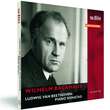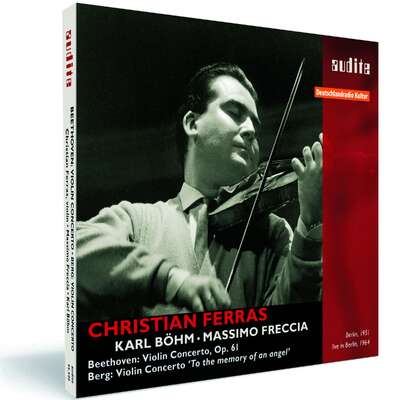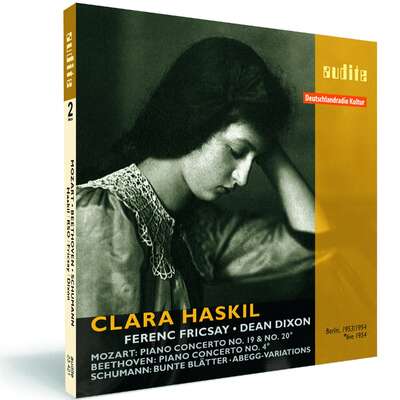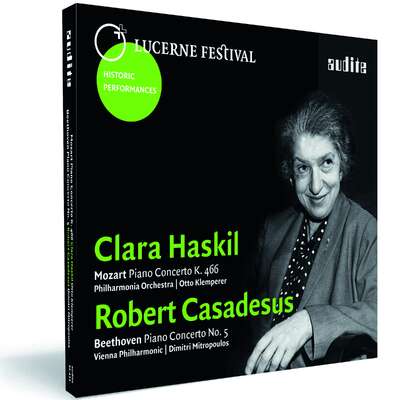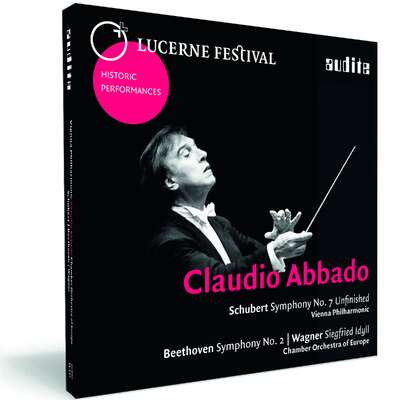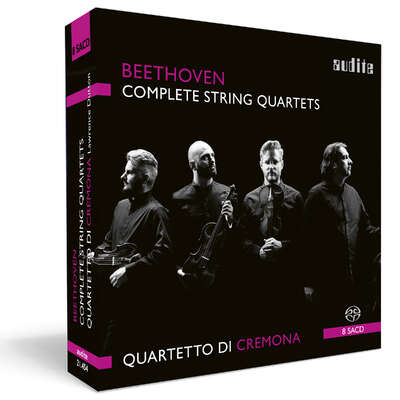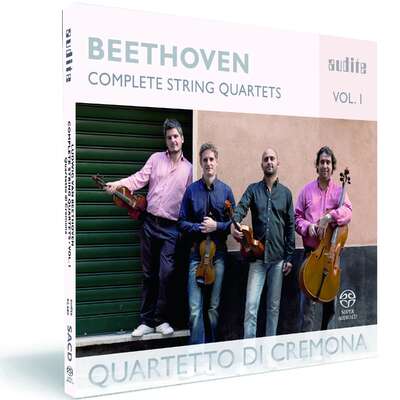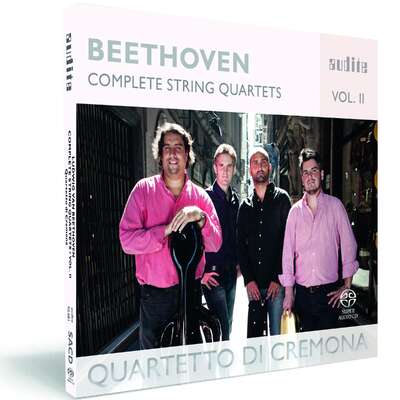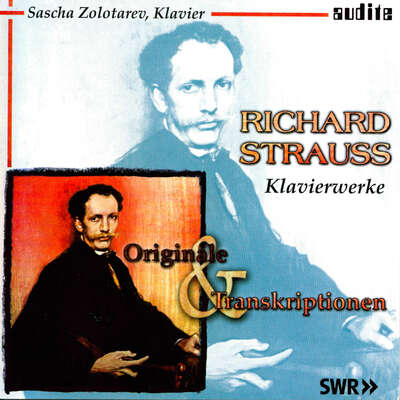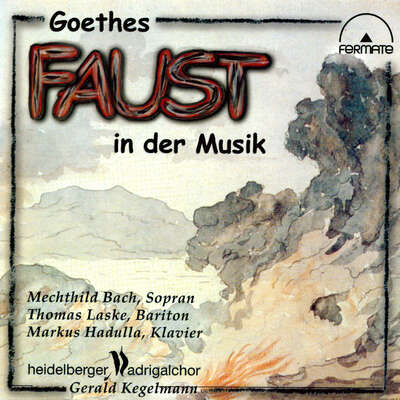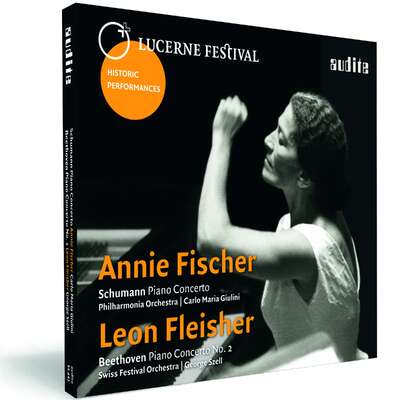
This live recording of a concert given by Backhaus during the last year of his life in Berlin features four great Beethoven piano sonatas and demonstrates the merits of his clear and – in the most positive sense of the word – classicist interpretational approach.more
"Nie Forcierung im Emotionalen, immer der richtige „Vollzug“ aus einem hörbar frisch gebliebenen Formgefühl heraus – es genügt, einige der Beethoven-Geheimnisse zu entschlüsseln." (Süddeutsche Zeitung)
Track List
Details
| Ludwig van Beethoven: Piano Sonatas | Wilhelm Backhaus | |
| article number: | 23.420 |
|---|---|
| EAN barcode: | 4022143234209 |
| price group: | BCA |
| release date: | 16. July 2010 |
| total time: | 85 min. |
Bonus Material
-
Producer's Comment
First-hand impressions of producer Ludger Böckenhoff [german]
Informationen
Even as a young man Wilhelm Backhaus was the epitome of a pianist who focused on performing a work as objectively as possible. With this aim, he proved a strong influence on the succeeding generation of pianists and constituted the opposite pole to Wilhelm Kempff’s playing. Backhaus’ domain was the classic-romantic repertoire from Bach to Brahms with Beethoven at the centre. During his long career on the concert platform, which lasted for over seventy years, Backhaus intensively explored the piano sonatas of Beethoven with remarkable technical reliability and a profound mastery of musical substance. This live recording of a concert – featuring four major sonatas, including the Waldstein Sonata, Op. 53, and the Sonata in E major, op. 109 – given in Berlin during the last year of Backhaus’ life (1969), once more demonstrates the merits of Backhaus’ clear and, in the most positive sense of the word, classicist interpretational approach: like almost no other pianist, he knew how to illustrate the content and architecture of this music without sacrificing the detail – but also without losing himself within it.
You can find a Producer’s Comment from producer Ludger Böckenhoff about this CD on our home page.
The production is part of our series „Legendary Recordings“ and bears the quality feature „1st Master Release“. This term stands for the excellent quality of archival productions at audite. For all historical publications at audite are based, without exception, on the original tapes from broadcasting archives. In general these are the original analogue tapes, which attain an astonishingly high quality, even measured by today‘s standards, with their tape speed of up to 76 cm/sec. The remastering – professionally competent and sensitively applied – also uncovers previously hidden details of the interpretations. Thus, a sound of superior quality results. CD publications based on private recordings from broadcasts or old shellac records cannot be compared with these.
Reviews
Scherzo | Jg. XXVI, N° 265 | Rafael Ortega Basagoiti | April 1, 2011
Grabación en vivo de cuatro bien conocidas Sonatas del ilustre sordo aMehr lesen
Diverdi Magazin | marzo 2011 | Roberto Andrade | March 1, 2011
Beethoven de referencia
Audite rescata, con maravilloso sonido, un recital de 1969 del gran Wilhelm Backhaus
Hace un año, señalaba en estas páginas a Wilhelm Backhaus (1884-1969) como uno de los grandes pianistas del siglo XX. Su dilatadísima carreraMehr lesen
Desde entonces, Backhaus fue un pianista de renombre mundial y mantuvo una fructífera relación con el fonógrafo para el que, en 1909, realizó la primera grabación de un concierto para piano y orquesta, el de Grieg, si bien en versión muy abreviada. Entre otros registros históricos figura la primera integral fonográfica de los Estudios de Chopin opus 10 y 25, fechada en 1929, que aun hoy resulta notable. Tanto por el repertorio que cultivó como por la forma de abordarlo, Backhaus fue un pianista clásico, objetivo, fiel a la partitura y, en tal sentido, adelantado a sus coetáneos (citemos solo a Paderewski), que a menudo se permitían unas libertades que hoy juzgamos inaceptables. Antes de la segunda guerra mundial, en su repertorio figuraron, además de Chopin, autores como Liszt o Rachmaninov que no asociamos con el Backhaus de posguerra. A partir de 1945, el pianist se centró en Bach, Mozart, Haydn, Schubert, Schumann, Brahms y, especialmente, Beethoven, de quien fue intérprete de referencia: ya en 1928 ofreció en concierto el ciclo de las 32 Sonatas.
Así lo demuestra este magnífico concierto, ejemplarmente grabado en Berlín por la RIAS el 18 de abril de 1969 en la sala de la Filarmonía. Backhaus abordó impávido, a sus 85 primaveras, un programa sin concesiones que superó con toda brillantez, formado por cuatro sonatas de Beethoven. Otros grandes pianistas como Arrau, Rubinstein u Horszowski no hubieron podido afrontarlo a esa edad. La longevidad de Backhaus fue excepcional si consideramos la estupenda forma, física y mental, en que se hallaba en el año de su muerte. La Sonata opus 53 , conocida como Waldstein o Aurora es una de las más insidiosas para el intérprete que Beethoven escribió. Su larga sección de desarrollo en el movimiento inicial exige un férreo control mecánico y, sobre todo, mental , para poder comunicar al oyente el complejo entramado musical beethoveniano, dominio que parece reservado a pianistas más jóvenes de lo que Backhaus era en 1969. En sus manos, la Sonata Waldstein adquiere una intensidad que prende al oyente en la red de su lógica inexorable y no lo deja escapar hasta su conclusión: Backhaus es un magistral arquitecto, un profundo recreador de esta imponente Sonata; las pequeñas imperfecciones mecánicas son irrelevantes. Y no menos admirable es la espléndida calidad de su sonido – poderoso o delicado según se requiera, siempre timbrado y redondo – el mismo que ofrecía en sus primeras grabaciones de comienzos de los años 50 para Decca, captado ahora por los micrófonos de la RIAS alemana en toda su dimensión, con el auxilio de una magnífica estereofonía. Espléndida también la Sonata opus 31.3, otra de las magnas creaciones de Beethoven, en la que Backhaus no solo muestra su autoridad indiscutible sino que responde con versatilidad a los muy diferentes estados de ánimo de sus cuatro movimientos – presididos por un desusado buen humor que no suele asociarse al músico de Bonn – que culminan en una brillantísima tarantela final. De nuevo asombra la vitalidad del intérprete, más inspirado y más convincente que en sus grabaciones de estudio. De las otras dos Sonatas ofrecidas en este concierto berlinés, la Pastoral opus 28 y la maravillosa opus 109 en mi mayor, cabe destacar las Variaciones que culminan esta última, por su claridad formal, su noble expresividad y su elocuencia. Uno de esos recitales que no se olvidan, recomendable con entusiasmo.
France Musique
| jeudi 20 janvier 2011 | January 20, 2011
BROADCAST Concert du midi
Bad Kissingen: Beethoven, Haydn
Sendebeleg siehe PDF!Mehr lesen
Fanfare | Issue 34:3 (Jan/Feb 2011) | Paul Orgel | January 1, 2011
Passagework is a little smudged here and there, and sometimes, Backhaus bangs or rushes slightly, but considering that this recording of one of hisMehr lesen
Considerable rubato heightens the tender character of op. 31/3’s minuet and the playful one in op. 28. Backhaus plays these two warm-hearted sonatas with real affection and no lack of speed in the fast movements. Op. 31/3’s Presto finale never lets up and is a technically impressive performance by any standard.
Technical limitations hinder Backhaus the most in the first movement of the “Waldstein” and in the finale’s motoric episodes, but he plays the work’s central Adagio sostenuto with convincing rhythmic freedom, and the third movement’s opening theme sings beautifully. He slows way down for the octave glissando passage and plays each octave with an individual stroke.
If the “Waldstein” is, overall, a performance to avoid, op. 109 is a pleasant surprise, a performance that improves as it goes on. Backhaus’s control falters at times in the opening movement with too many arpeggiated chords and some shaky timing, but the prestissimo second movement is solidly played and he rises to the occasion of the third movement’s variations—there is no more beautiful movement in any Beethoven sonata—with an eloquent, unfussy performance that is both technically impressive and emotionally soaring.
Listeners seeking refinement of touch should look elsewhere—almost any pianist I can think of would strive for more subtle balances between melody and accompaniment, more clearly delineated degrees of non-legato or staccato, and more sparing pedal—but I recommend this recording for its documentaton of an important Beethoven specialist playing extraordinarily well, considering his age, in three of the four sonatas. The music-making is very much alive. The miking sounds close, the recording is in stereo, and Backhaus’s Bechstein is a bright, clear sounding instrument.
Diapason | N° 586 décembre 2010 | Jean-Charles Hoffelé | December 1, 2010
Les studios d'enregistrement, que Wilhelm Backhaus a beaucoup fréquentés, pouvaient ternir sa sonorité, brider son imagination pourtant puissante.Mehr lesen
WETA fm | Wednesday, 11.17.10, 4:00 pm | Jens F. Laurson | November 17, 2010 Bits of Beethoven (Sonatas): Steven Osborne, Wilhelm Backhaus, Solomon
Recordings of new Beethoven Piano Sonata elicit conflicting emotions. IfMehr lesen
Fono Forum | Dezember 2010 12/10 | Ingo Harden | November 17, 2010 Alt und gut
Die Erstveröffentlichung des Beethoven-Abends, den der 85-jährige Wilhelm Backhaus im Mai 1969 in Berlin gab, ist einer der wertvollen Funde auf demMehr lesen
Die neuen Mitschnitte aus dem RIAS Fundus ergänzen dieses Bild ähnlich aufschlussreich wie Deccas legendäres, im Ton sehr persönliches "letztes Konzert" vom Juli desselben Jahres. Sie machen erfahrbar, was die künstlerische Bedeutung Backhaus' im Kern ausmachte: nämlich über die souveräne (und uneitel eingesetzte) technische Beherrschung des Instruments hinaus der sichere Blick für die inneren Zusammenhänge des Komponierten. Ihnen ordnete er mit großem Zugriff alle Einzelheiten unter, seine "Klassizität" hatte nichts mit den Notenfuchsereien zu tun, die heute gerne mit diesem Etikett versehen werden.
Am eindrucksvollsten offenbart sich dieser große Backhaus im ersten Satz der späten E-Dur-Sonate, deren fantasieartiger Charakter wohl kaum jemals eindringlicher herausgespielt wurde als an diesem Abend. Tadelloses Remastering, vor lauten Akkorden machen sich leise, an entschwundene und fast schon vergessene Tonbandzeiten erinnernde "Vorechos" bemerkbar.
www.ResMusica.com | 16 novembre 2010 | Patrick Georges Montaigu | November 16, 2010 Le dernier Backhaus reste une référence
Ce récital Wilhelm Backhaus consacré à des sonates de Beethoven a étéMehr lesen
Columns - Sound and Music - Novità discografiche | Novembre 2010 | - | November 1, 2010
Fin dai primi anni della sua lunga carriera Wilhelm Backhaus si accostò a ogni opera con la massima obiettività possibile. Sotto questo aspettoMehr lesen
Universitas | Nr. 11/2010 | Adelbert Reif | November 1, 2010
Kaum mehr überblickbar ist die Anzahl junger Pianisten und Violinisten,Mehr lesen
www.musicweb-international.com | November 2010 | Jonathan Woolf | November 1, 2010 | source: http://www.music... The last testament of this eminent musician
There is something indomitable, indeed magnificent, about Backhaus’s recital at the Philharmonie in April 1969, given shortly before his death inMehr lesen
The Pastoral sonata opens with a real sense of occasion, and it shows a formidable awareness of the need for flexibility within a strongly etched rhythm. The slow movement is neither over-stressed nor over-romanticised, but full measure of pawkiness attends the scherzo – heavy, assuredly, in part at least, but with a gnarly wit and plenty of rubati. This presages a fleet, fluent finale. The E flat major Op.31 No.3 sonata manages to combine strength of sinew and light heartedness of spirit. Its scherzo is full of energetic playfulness and one listens in admiration as Backhaus delivers on the finale’s con fuoco marking with commensurate power and not a little swagger. By the Waldstein one begins to feel him tiring. Three years ago I reviewed a performance he gave of this sonata in the Beethovenhalle, Bonn, in September 1959. This earlier live traversal is lighter than the decade-later one under review, and contains fewer slips, though this does seem to have been a work that caused him digital problems notwithstanding the dates of the performances. What he invariably located in it however was a wonderfully sustained sense of piety. The second disc contains only the E major Op.109. It opens in rather ‘tripping’ fashion, but features a strong Prestissimo, and then the noble unfolding of the finale, which in this performance marries tonal depth to graphic architectural assurance.
Backhaus’s complete Beethoven sonata recordings are on the 8 CD Decca Original Masters 475 7198 and various other examples of all the four sonatas played in 1969 exist, from 78s in the case of the earlier two to 1950 Deccas – these in addition to the 1960s Deccas contained in the box noted above. So, there is quite a deal of choice for even the Backhaus completist, but not even that fact should dent enthusiasm for the last testament of this eminent musician enshrined in this recording.
American Record Guide | 01.11.2010 | John P. McKelvey | November 1, 2010
This was recorded in concert in Berlin in April 1969, about 10 weeks before the pianist died (July 5). The broadcast tapes give us sound that is lessMehr lesen
These performances lack the clarity and ambience of the ones recorded by Decca, but they compensate with an element of freshness and spontaneity lacking in the studio productions. The earlier works, Nos. 15 and 18 have a spontaneity mighty scarce in the recorded competition. The Waldstein, No. 21, is also very good—a slow though weighty, extremely forceful and powerful account. The splendid account of No. 30, intimate and thoughtful to a fault, has a 17 minute CD to itself, since the 86- minute program is too long for a single disc. Audite does not charge full price, but 24 US dollars is still pretty hefty. The edition is handsomely packaged with copious notes and illustrations. All the pictures show Backhaus not as he looked at age 85, when these recordings were made, but instead about 30 years earlier. The notes are really excellent, and in themselves almost worth the price of the recordings. Backhaus was obsessed with privacy. Information about his life has been hard to come by. The notes go rather far to ameliorate that difficulty, and are definitely quite valuable to anyone seeking to penetrate the veil of silence the pianist erected.
klassik.com | Oktober 2010 | Kai Schabram | October 19, 2010 | source: http://magazin.k... 'Metronom' oder Mediator?
Wilhelm Backhaus’ Ruf als Interpret von Weltrang gründet in ersterMehr lesen
ouverture Das Klassik-Blog | Sonntag, 17. Oktober 2010 | October 17, 2010
Wilhelm Backhaus (1884 bis 1969) debütierte als Zwölfjähriger imMehr lesen
France Musique | mercredi 13 octobre 2010, 8h40 | Christophe Bourseiller & Jean-Michel Boissier | October 13, 2010 BROADCAST Musique matin
Sendebeleg siehe PDF!Mehr lesen
Classica – le meilleur de la musique classique & de la hi-fi | n° 126 octobre 2010 | Jacques Bonnaure | October 1, 2010
Une beauté intemporelle
Au soir de sa vie. Wilhelm Backhaus laisse un témoignage conciliant urgence, pureté et d’une intense expressivité.
Le 18 avril 1969, Wilhelm Backhaus donnait à Berlin ce récital de sonatesMehr lesen
BBC Radio 3 | Sat 18 Sep 2010, 10.45 am | Andrew McGregor | September 18, 2010 BROADCAST CD review
Recent releases:<br /> Kenneth Hamilton talks with Andrew about recent releases of Beethoven piano music.<br /> <br /> Sendebeleg siehe PDF!Mehr lesen
Kenneth Hamilton talks with Andrew about recent releases of Beethoven piano music.
Sendebeleg siehe PDF!
Kenneth Hamilton talks with Andrew about recent releases of Beethoven piano music.
Sendebeleg siehe PDF!
Märkische Oderzeitung | Mittwoch, 15. September 2010 - 21. Jahrgang Nr. 215 | Peter Philipps | September 15, 2010 Fast akademischer Klang
Wir haben Lang Lang am Klavier – und wenn es etwas ungewöhnlicher seinMehr lesen
Morgenpost am Sonntag | Sonntag, 12. September 2010 | September 12, 2010
Beethovens Klaviersonaten bilden einen eigenen Kosmos in der klassischenMehr lesen
Süddeutsche Zeitung | Mittwoch. 8. September 2010 | Wolfgang Schreiber | September 8, 2010
Jung und Alt
Wilhelm Backhaus verabschiedete sich von Berlin mit Beethoven
Es kann spannend und sogar von Nutzen sein, im Leben wie in der Kunst, denMehr lesen
Piano News | September / Oktober 5/2010 | Carsten Dürer | September 1, 2010 Richter, Gulda, Backhaus, Fischer etc.
Die Flut an historischen Einspielungen, die wieder oder erstmals auf denMehr lesen
Westdeutsche Allgemeine Zeitung | Donnerstag, 26. August 2010 | Hajo Berns | August 26, 2010 Wiederhören mit Wilhelm Backhaus und Beethoven
„Phänomenal für sein Alter“, hieß es, als Wilhelm Backhaus alsMehr lesen
Audiophile Audition | August 11, 2010 | Gary Lemco | August 11, 2010
Backhaus stands as among the most consistently satisfying of all BeethovenMehr lesen
Wochen-Kurier | Mittwoch, 4. August 2010 - Nr. 31 | Michael Karrass | August 4, 2010
Wilhelm Backhaus galt bereits in frühen Jahren als Inbegriff einesMehr lesen
La Musica | 2010 August | August 1, 2010 Beethoven
koreanische Rezension siehe PDFMehr lesen
